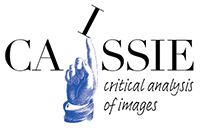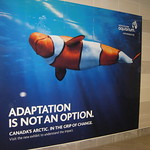Image Attribution: “Adaptation Is Not An Option” by Martin Kalfatovic is licensed under CC BY-NC-SA. (See interactive map)
This advertisement comes from The Vancouver Aquarium in 2009 and this image was originally posted by Martin Kalfatovic. It was displayed as a poster in various places around the city and on the internet. It contains a discolored reindeer in a frozen landscape, a cloudy background and a chunk of text above the reindeer. The apparent intention of the advertisement is to remind you of climate change and it’s potentially devastating effects. The frozen white landscape guides our eyes towards the reindeer. Upon further inspection it appears as if the reindeer has miraculously adapted spots similar to a giraffe’s as opposed to it’s normal brown and white hues. The background is blurry and filled with clouds to keep our attention on the subject in the foreground.The subject itself initially confuses or shocks more than anything. As we make our way to the text we see, “ADAPTATION IS NOT AN OPTION. CANADA’S ARCTIC. IN THE GRIP OF CHANGE.” This piece of text is very well put together, they used short, drastic sentences with attention grabbing words and topped it off by putting them all in bold, capitalized letters. Underneath this we have another piece of text that’s put together very differently; a smaller font that is not capitalized, “Visit the new exhibit to understand the impact.” The intent is for you to read this last and to make you believe they are able to educate you about climate change. frozen barren wasteland deeply contrasts against this adapted creature, the animal just does not seem to belong there. This is a visually striking image that at first confuses you, but upon reading the text you are only intrigued and eager to learn more. It does a terrific job in getting its message to the people who care, by sticking out in their urban environments because of their bright contrasting colours. They were also large enough to be read without standing in front of it, which helped it remain visible in high traffic areas. This is a well put together advertisement that confuses, intrigues and brings forth environmental sympathy. Although this is an older advertisement, it does align with the brand they hope for as a conservation organization. In recent years their ethics and priorities have been questioned by many since they opened a lawsuit against The Vancouver Parks Board over the banning of cetacean captivity even after the aquarium itself said it would no longer keep dolphins or whales in 2018. One voice in particular is the Vancouver Humane Society’s Peter Fricker, who highlights many questionable ethical decisions. These include, but are not limited to, “Restraints on speaking out against threats to marine life.” and “A drift toward becoming a zoo?” (Fricker, 2019) Referring to the large donation of around $12.5 million from a mining company called Teck, which could explain their silence regarding the Trans Mountain pipeline project, and the aquarium’s collection of non-aquatic animals respectively. The article shows exactly what it is entitled, “The Vancouver Aquarium needs a new vision.” (Fricker, 2019) He concludes by outlining their immense opportunity for genuine change and new vision, but they must decide if they are going to be a tourist attraction or a genuine conservation organization.
Fricker, Peter. “The Vancouver Aquarium Needs a New Vision.” Vancouver Humane Society, 2 June 2020vancouverhumanesociety.bc.ca/posts/the-vancouver-aquarium-needs-a-new-vision/.

